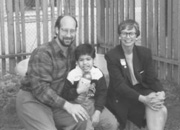FOR IMMEDIATE RELEASE
Friday, November 03, 2006
|
Peace Corps
Contact: Press Office
Phone: 202.692.2230
Fax: 202.692.1379
Email: pressoffice@peacecorps.gov |
|
Jamaica Looks to Peace Corps to Help Those With Disabilities |
|
In recognition of Disability Awareness Month, which just ended,
this is the latest feature on Volunteers making a difference.
WASHINGTON, D.C. – To most, Jamaica is an ideal vacation destination, but for recently returned Crisis Corps Volunteer David Grant, Jamaica is a country making new efforts to improve special education curriculum in schools.
"Every teacher I have talked to around the U.S., as well as teachers from other countries, would love to share their skills in developing countries where formal special education teacher training doesn't exist," Grant said.
 Ever since Grant's time as a Peace Corps Fellow at the University of Southern California, Grant has seized the opportunity to "work the trenches." So when the Jamaican government recently looked to include special needs curriculum into the school systems, Grant, who holds a Ph.D. in international/intercultural education from USC, seemed a perfect fit to help monitor the curriculum and ensure uniformity in teaching methods and delivery. Ever since Grant's time as a Peace Corps Fellow at the University of Southern California, Grant has seized the opportunity to "work the trenches." So when the Jamaican government recently looked to include special needs curriculum into the school systems, Grant, who holds a Ph.D. in international/intercultural education from USC, seemed a perfect fit to help monitor the curriculum and ensure uniformity in teaching methods and delivery.
Leaving his family to return to Peace Corps' Crisis Corps program and make a difference, Grant landed in Jamaica knowing he could only help by starting at square one. To learn about Jamaica's educational process, he would have to ask, so he talked to everyone who would take the time, from his landlady to students to the Minister of Education.
Grant also began watching Jamaican news and reading the newspaper to become fully immersed in Jamaica's media culture. He examined Jamaica's educational codes and curriculums and realized that the majority of the materials had not been updated since 1981 — and included little mention of special education. After he completed his field research, Grant developed a plan of action that included measurable goals for Jamaican schools and special education curriculum.
Partnering with the Jamaican Association for Mental Retardation (JAMR), Grant helped monitor the way special education students were taught in classrooms across Jamaica. He implemented a system where individual education plans were made for each student. Grant acted as a resource for teachers when it came to special education, and he created a successful mentoring program, connecting local businesses with special education students.
A strong believer that a hands-on approach is best, Grant emphasized the importance of individual accommodations. Knowing that most schools had scarce resources, Grant proposed smallest adjustments that could make the difference, for example, a student in an art class was so overwhelmed by his wheelchair that he could barely see the tabletop, let alone the paper. Grant encouraged the art teacher to reposition the student so he could fully participate in the activity, and ultimately, watch his strokes color the page.
"Success is predicated on creating higher levels of performance expectations of the disabled on the part of the local communities, especially families, teachers and local business people," Grant said. "Once the regular presence of the disabled on the job is accepted, the rest comes more easily."
After graduating from college and beginning a media career, Grant said he had an early "mid-life crisis" and believed the Peace Corps was a doable goal and applied. Grant remembered how his high school history teacher had passionately described her Peace Corps experience. Accepted in 1990, Grant packed his bags and headed for Chad, a country in central Africa.
"My professional path, however rambling, was started in Chad as a Volunteer," Grant said. "I had no idea what to expect. It was an adventure and I leapt into the unknown."
In Chad, Grant was trained in water and sanitation education, implementation, and programming skills. He produced a manual in both French and English about how to maintain water pumps. He also taught English in N'Djamena, the capital. After his Peace Corps service was over, Grant stayed in Chad for four additional months and taught English to UNICEF Volunteers.
Upon his return to the States, Grant began a lifelong career in the field of special education. He worked as a special education teacher in Los Angeles for five years. He continued his quest to help students and took a position as a special education teacher with the Georgia Department of Juvenile Justice. His career later moved him back west, to Arizona, where he worked for several organizations that serve special education needs, including a position as vice president for vocational programs in the Arizona office of Easter Seals.
"I wanted to gain the experience and training in the U.S., and then take the rest of my life to apply the skills overseas where it's most needed," said Grant.
Since Crisis Corps' inception in 1996, hundreds of returned Peace Corps Volunteers have taken the opportunity to use their invaluable skills and experience to address ongoing community needs in over 40 different countries. Crisis Corps Volunteers work on short term projects, utilizing the skills they learned as Peace Corps Volunteers and in post service careers. To learn more about the Peace Corps' Crisis Corps program, please visit the Crisis Corps site.
The Peace Corps is celebrating a 45-year legacy of service at home and abroad, and a 30-year high for Volunteers in the field. Since 1961, more than 182,000 Volunteers have helped promote a better understanding between Americans and the people of the 138 countries where Volunteers have served. Peace Corps Volunteers must be U.S. citizens and at least 18 years of age. Peace Corps service is a 27-month commitment.
###
|